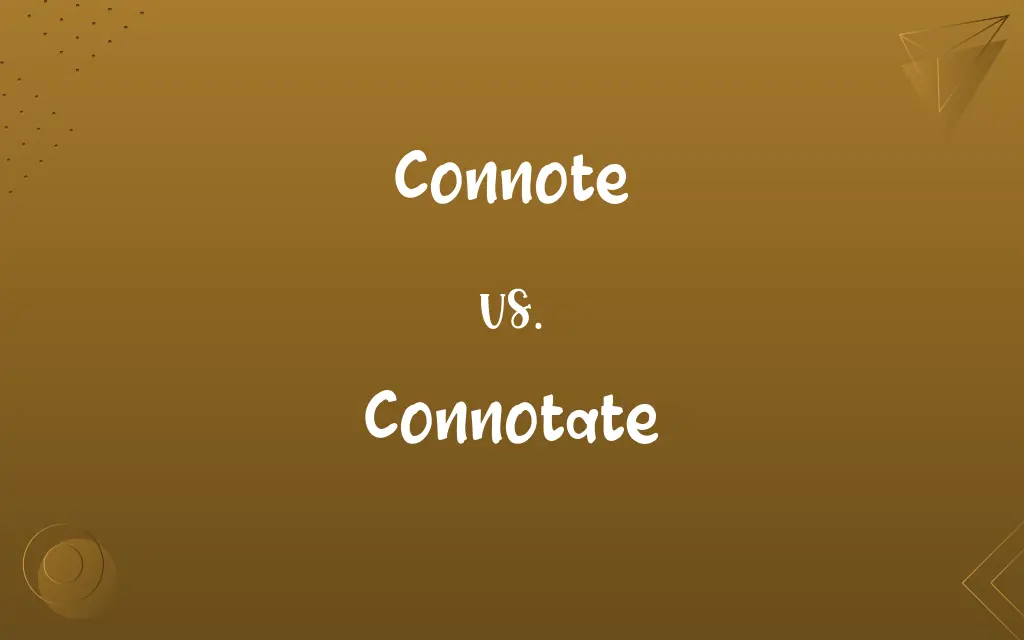Connote vs. Connotate: Know the Difference

By Shumaila Saeed & Dua Fatima || Updated on March 6, 2024
Connote refers to the implied or suggested meaning of a word, while connotate is less commonly used but essentially means the same.

Key Differences
Connote refers to the implied or secondary meanings that a word evokes in addition to its primary, denotative meaning. This can include emotional or cultural associations. Connotate, on the other hand, is a less commonly used term that essentially serves the same purpose, indicating the act of implying or suggesting a meaning beyond the literal one.
Dua Fatima
Mar 06, 2024
When discussing literature, connotation is a crucial concept for analyzing the depth of textual interpretation. Whereas connotate might appear in discussions, its usage is infrequent, and the term is often considered redundant or unnecessary by many language experts.
Shumaila Saeed
Mar 06, 2024
Connotation enriches language by allowing words to carry complex associations and emotional nuances. In contrast, the use of connotate, though valid, might confuse or slow down the flow of discussion due to its rarity and perceived awkwardness in conversation.
Shumaila Saeed
Mar 06, 2024
Writers and speakers carefully choose words with strong connotations to evoke specific reactions or emotions. Meanwhile, the term connotate might not be chosen at all, given its obscurity and the preference for the more direct and well-understood "connote."
Hifza Nasir
Mar 06, 2024
In educational contexts, teachers emphasize the importance of understanding connotations for effective communication and analysis. However, the term connotate might rarely, if ever, appear in curriculum materials, reflecting its marginal status in the lexicon.
Shumaila Saeed
Mar 06, 2024
ADVERTISEMENT
Comparison Chart
Definition
Imply or suggest an additional meaning beyond the literal one
Essentially the same as connote, but less commonly used
Shumaila Saeed
Mar 06, 2024
Context
Widely used in literature, communication, and analysis
Limited use and often considered unnecessary
Shumaila Saeed
Mar 06, 2024
Importance in Language
Essential for understanding nuance and emotional undertones
Viewed as redundant given the presence of "connote"
Hifza Nasir
Mar 06, 2024
Example Usage
"The word 'home' connotes warmth and safety."
"The word 'home' can connotate warmth and safety."
Hifza Nasir
Mar 06, 2024
ADVERTISEMENT
Connote and Connotate Definitions
Connotate
Imply similarly additional meaning.
Dove can connotate peace, though less commonly said.
Hifza Nasir
Mar 06, 2024
Connote
Indicate metaphorical meaning.
Chains connote imprisonment or restriction.
Dua Fatima
Mar 06, 2024
Connotate
Given its rarity and similarity to connote.
Will mirror those of connote, emphasizing its less frequent use.
Shumaila Saeed
Mar 06, 2024
Connote
Suggest cultural significance.
Eagle connotes freedom in American symbolism.
Shumaila Saeed
Mar 06, 2024
ADVERTISEMENT
Connotate
Evoke a comparable emotional response.
Shark might connotate danger in specific contexts.
Hifza Nasir
Mar 06, 2024
Connote
Imply additional meaning.
The word dove connotes peace in many cultures.
Shumaila Saeed
Mar 06, 2024
Connotate
Suggest similar cultural significance.
Eagle could connotate freedom, albeit less frequently.
Dua Fatima
Mar 06, 2024
Connotate
Reflect similar societal values.
Green might connotate environmentalism, though seldom used.
Hifza Nasir
Mar 06, 2024
Connote
To suggest or imply in addition to literal meaning
The word "lion" denotes a kind of wild cat but connotes courage and dignity.
Shumaila Saeed
Oct 19, 2023
Connotate
Indicate analogous metaphorical meaning.
Chains may connotate restriction, but less often.
Shumaila Saeed
Mar 06, 2024
Connote
To have as a related or attendant condition
For a political leader, hesitation is apt to connote weakness.
Shumaila Saeed
Oct 19, 2023
Connotate
To connote; to suggest or designate (something) as additional or representative; to imply.
Shumaila Saeed
Oct 19, 2023
Connote
(transitive) To signify beyond its literal or principal meaning.
Racism often connotes an underlying fear or ignorance.
Shumaila Saeed
Oct 19, 2023
Connotate
To connote; to suggest or designate (something) as additional; to include; to imply.
Shumaila Saeed
Oct 19, 2023
Connote
(transitive) To possess an inseparable related condition; to imply as a logical consequence.
Poverty connotes hunger.
Shumaila Saeed
Oct 19, 2023
Connote
To mark along with; to suggest or indicate as additional; to designate by implication; to include in the meaning; to imply.
Good, in the general notion of it, connotes also a certain suitableness of it to some other thing.
Shumaila Saeed
Oct 19, 2023
Connote
To imply as an attribute.
The word "white" denotes all white things, as snow, paper, the foam of the sea, etc., and ipmlies, or as it was termed by the schoolmen, connotes, the attribute "whiteness."
Shumaila Saeed
Oct 19, 2023
Connote
Involve as a necessary condition of consequence; as in logic;
Solving the problem is predicated on understanding it well
Shumaila Saeed
Oct 19, 2023
Repeatedly Asked Queries
Why is connotation important?
Connotation is important because it adds depth, emotional resonance, and cultural significance to language.
Shumaila Saeed
Mar 06, 2024
Can a word have more than one connotation?
Yes, a word can have multiple connotations depending on context and cultural background.
Shumaila Saeed
Mar 06, 2024
How does connotate differ in usage compared to connote?
Connotate is used much less frequently and is often considered unnecessary or redundant.
Shumaila Saeed
Mar 06, 2024
What does connote mean?
It means to imply or suggest an additional, often non-literal meaning associated with a word or phrase.
Dua Fatima
Mar 06, 2024
Is connotate the same as connote?
Yes, connotate essentially means the same as connote but is less commonly used.
Shumaila Saeed
Mar 06, 2024
How can I identify the connotation of a word?
By considering the word's context, cultural implications, and the emotional responses it evokes.
Dua Fatima
Mar 06, 2024
Is connotate recognized in dictionaries?
Yes, connotate is recognized but often with a note about its rarity or similarity to connote.
Shumaila Saeed
Mar 06, 2024
How does connotation affect communication?
Connotation affects communication by adding layers of meaning that can enrich or complicate understanding.
Dua Fatima
Mar 06, 2024
Do all words have connotations?
Many words have connotations, especially those that are abstract or loaded with cultural significance, though some may be more neutral.
Shumaila Saeed
Mar 06, 2024
Can connotation change over time?
Yes, the connotations of words can evolve with changes in culture, attitudes, and usage.
Shumaila Saeed
Mar 06, 2024
How can I improve my understanding of connotations?
By reading widely, studying cultural contexts, and paying attention to the emotional and cultural nuances of words.
Dua Fatima
Mar 06, 2024
Is understanding connotation important for language learners?
Yes, understanding connotation is crucial for grasping the nuances and deeper meanings in a new language.
Shumaila Saeed
Mar 06, 2024
Why might someone use the term connotate?
They might use it unknowingly due to its similarity to connote or in an attempt to be more specific or nuanced.
Hifza Nasir
Mar 06, 2024
Can misunderstanding connotations lead to communication issues?
Yes, misunderstanding the connotations of words can lead to misinterpretation and confusion.
Shumaila Saeed
Mar 06, 2024
Are connotations universally agreed upon?
Not always; connotations can vary significantly across different cultures and individual experiences.
Shumaila Saeed
Mar 06, 2024
Share this page
Link for your blog / website
HTML
Link to share via messenger
About Author
Written by
Shumaila SaeedShumaila Saeed, an expert content creator with 6 years of experience, specializes in distilling complex topics into easily digestible comparisons, shining a light on the nuances that both inform and educate readers with clarity and accuracy.
Co-written by
Dua Fatima








































































